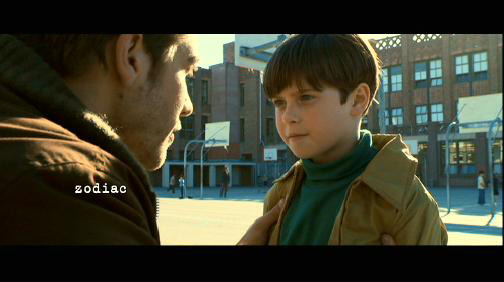
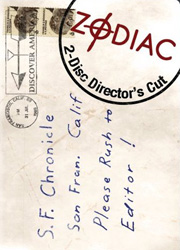 BUY IT AT AMAZON: CLICK HERE
BUY IT AT AMAZON: CLICK HERE
STUDIO: Paramount
MSRP: $34.98
RATED: R
RUNNING TIME: 162 Minutes
SPECIAL FEATURES:
- Commentary by: Director David Fincher
- Commentary by: Jake
Gyllenhaal, Robert Downey Jr., James Vanderbilt, Brad Fischer, and
James Ellroy - Zodiac Deciphered: An exhaustive behind-the-scenes documentary
- The Visual Effects of Zodiac
- Previsualization: Split-screen comparisons between animatics and finished film
- This is the Zodiac Speaking: All-new feature-length documentary covering every aspect of the investigation
- His
Name was Arthur Leigh Allen: The truth about the prime suspect in the
Zodiac case from people who knew him and the police who investigated
him.
The Pitch
The Zodiac killer strikes terror into the city of San Francisco, infecting a reporter with the insatiable urge to solve the case, whatever the cost. David Fincher’s in-depth procedural tale of obsession is an acting showcase that focuses on the policemen and journalists rather than the killer and his victims.
The Humans
Director: David Fincher
Writer: James Vanderbilt, Robert Graysmith (book)
Cinematographer: Harris Savides
Cast: Jake Gyllenhaal. Robert Downey, Jr. Mark Ruffalo. Anthony Edwards. Chloë Sevigny. Elias Koteas. Brian Cox. John Carroll Lynch. John Getz. Dermot Mulroney. Donal Logue. Philip Baker Hall. James Legros. Charles Fleischer.
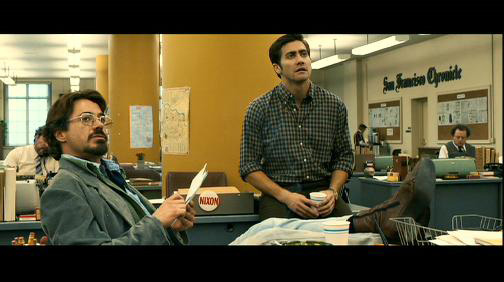
Tony Stark and Peter Parker watch in bemusement as Galactus devours New Jersey on TV.
The Nutshell
With Zodiac David Fincher takes his incredible skills as a director to new heights, evoking and ultimately surpassing the amazing All the President’s Men with a digitally shot tale of obsession, frustration, and the resulting epic now stands as the best procedural ever released in theaters. A very meat and potatoes case mired not in brilliant scheming by the killer nor big Sherlock Holmes deductions by the pursuers, the Zodiac investigation by both the police and the reporters who became obsessed with it represents one of the last major analog investigations from a bygone era not dependent on technology or science but rather hunches, tenacity, and the limitations of the legal process. By moving past the killings themselves in the first act, the majority of Zodiac is a quiet and engrossing look at a few men doing their best to restore peace to San Francisco in the late 1960’s and beyond, owing more to the Alan J. Pakula classic mentioned above than flashier tales of investigation like JFK or Fincher’s own Seven.
The Lowdown
Six minutes into Zodiac it’s already apparent that this isn’t your typical Hollywood yarn, evidenced by its lulling and effortless introduction to the immediate and relentless violence that follows. In six minutes David Fincher has shown his audience one of the very few moments of action in his movie, established a straightforward and almost documentary style approach to his material, and forever changed the way I listen to the song Hurdy Gurdy Man.
And the film gets better from there.
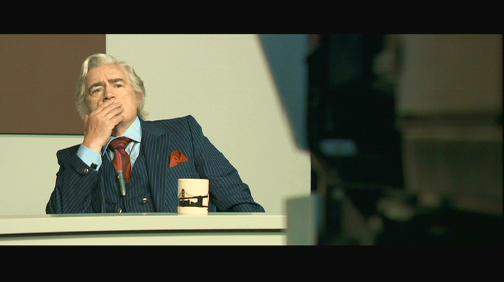
Brian Cox sniffs the fist that gets to fist the stiff of Brian Cox.
The Zodiac case is compelling as much for its total lack of closure as much as for its grisly evidence, violent and closely personal murders whose seemingly random nature left everyone looking over their shoulders in the Bay Area. It’s one of the great unsolved cases in history, and one that had the nation rapt with attention thanks largely due to its usage of the mass media as a form of communication between a killer, his pursuers, and the general public. Robert Graysmith is the real-life cartoonist for the San Francisco Chronicle who made the case more than a job but the singular driving force in his life [it’s his book(s) that fueled the script for this film as well as much of the Zodiac case’s longevity in the public eye] and as portrayed by Jake Gyllenhaal he’s kind of a geeky outsider who is the only one on staff who really is posessed by the mystery right out of the gate. Initially his interest is treated with indifference by his co-workers but as things get more crazy his ideas make more sense. Soon, he has a partner in the person of the eccentric Paul Avery [played to delicious effect by Robert Downey, Jr.] and the game is most wonderfully afoot.
The film balances between the work of the intrepid newspaper men and the police, which begins by focusing on Inspectors Toschi and Armstrong [the amazing Mark Ruffalo and Anthony Edwards, respectively] and then fans out into the meat of the film’s extraordinary supporting cast of inventive, solid character actors. The Zodiak himself is merely a catalyst. A force of nature that ups the ante on the case and his actions and lack of usable evidence often adds to what makes the whole issue such a headscratcher.
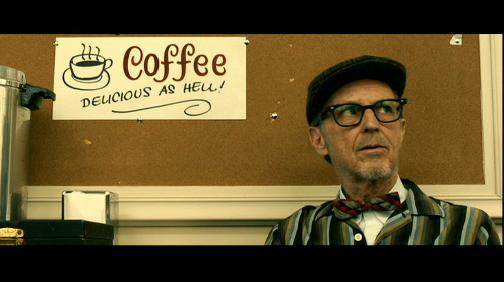
"It had better be", thought Shifty Irving. "Otherwise I’d be wasting my wife’s ashes for nothing."
There’s a playful nature to the first stabs at being a crime solver for Graysmith, first from his cheap seats attempts at helping all the way through his blue cocktail infused first night brainstorming with Paul Avery. Before it consumes him, the idea of getting cryptic codes from a killer and trying to make sense of them is rather like a game. The stakes being what they are, seeing the fresh-faced father go from inquisitive nobody to one of the major players in the case is a smooth and slow burn into the obsession that holds the story together. Much has been said about Gyllenhaal being the weak link in the cast but his work here is very subtle and keeps the downbeat proceedings and numerous dead ends from weighing too heavily on the overall product. Even as his life begins to unravel, Gyllenhaal makes Graysmith a nice neutral foundation for Fincher to paint his latest master work. When paired with the eccentric Downey or butting heads with Mark Ruffalo, the young actor holds his own admirably and though his performance isn’t one of the ones that will earn major accolades, it’s a very solid and complementary one.
But the meaty parts go to Downey, Ruffalo, and Brian Cox as the grandstanding celebrity lawyer Melvin Belli. Because this is a procedural, though amazingly as he shoots the attack scenes, Fincher isn’t concerned with flash and needs to have some really fantastic character moments come out. They are the secret weapon of Zodiac, the rogue’s gallery of great men and women with whom the film fills its dialogue scenes and margins with.
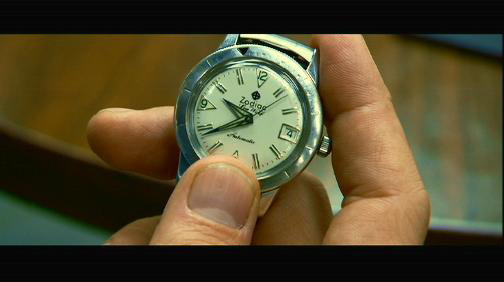
So much more reliable a timepiece than the Bernie Goetz or Gary Gilmore models.
Downey has proven time and time again that when paired
with good material there’s nothing he can’t do and though Paul Avery is
absent for major chunks of the film his aura presides over it thanks to
the eloquent and sassy work by the great actor. Ruffalo represents the class of the police department as well as its frustration as the rock star cop that inspired Bullitt chases the Zodiac hard until he too becomes a casualty of the long and unfruitful process. Ruffalo is one of those actors that is so valuable in supporting roles like this where he can really develop his character for those several prominent scenes he’s in and fill them with zest and nuances that pay off in repeat viewings. Between the flamboyant and unfiltered Avery and the tightly wound and clean cut Graysmith, Toschi is the perfect balance and in a lesser film he’d be the star of the piece and handed a few chase sequences that would totally undercut what Fincher and James Vanderbilt have done but here they simply let good actors do their thing and trust that the audience is intelligent enough to get behind the concept. Brian Cox gets to ham it up, but only because he’s playing a hammy, pompous character. Though hardly essential to the narrative, his scenes are always ones where meaty development of the Zodiac character is made and it allows the audience to stay engaged even though the villain is never onscreen. Special mention must go to John Carroll Lynch, who in a tiny amount of scenes showcases a wide array of facets to Arthur Leigh Allen, the principal suspect in the case. The scene where he’s interviewed at the workplace is truly one of the great cinematic sequences of 2007.

All three were in awe that they got the priviledge of interviewing the Bald Behinder.
The bottom line is that Zodiac is the kind of movie that recalls the great investigative films of the 70’s before everything got so dumb and in such a hurry. It’s smart, classy, and is definitely a film that is about the ride rather than the setup or the outcome. It’s not a happy story nor an easy one. Though more deliberately paced than his previous work, David Fincher still showcases his knack at marrying technique and creativity as he takes us back in time with perfect period costumes and recreation both in set design and incredible digital special effects. It’s an knockout of a movie, one of the best in the past ten years.
This second DVD release is the director’s cut, because though Fincher had final cut a few scenes were excised for time or because they were deemed extraneous. Back in the film, a nice long black screen filled with music and news clippings to showcase the passage of time adds a little emotional flair, a scene where Paul Avery is awoken in his car is good for a chuckle or two, a nice scene involving the cops on the case getting their materials together via speakerphone, and a few other little goodies tossed are in to complete the deal and make the six or seven extra minutes add to the film without slowing it down. As it stands it’s a very fast moving 162 minutes.
The result is nothing less than a film anyone who loves film for more than superficial thrills needs to own and own immediately. Zodiac is a gorgeously made modern classic and further proof that the digital filmmaking world is not something to be scared of at all but rather embraced with both arms.
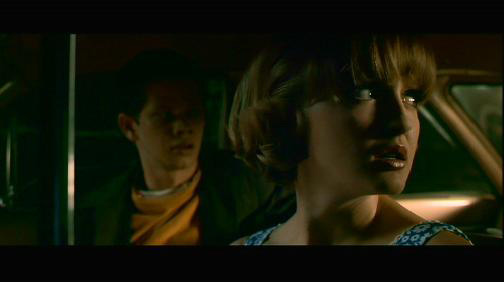
"Shit, my lady found us making time together…"… "Wait a minute… you’re dating the Sun TOO?"
The Package
The feature length commentary track by the director makes the purchase a worthwhile one in its own right. It’s a jam-packed commentary that showcases just how much research and deliberation went into every frame of this film. The obsession present in the film is matched by the filmmakers and Fincher delivers a very informative and oftentimes entertaining track. Though he has a reputation of being difficult, there’s nothing on the commentary track to indicate so. All it showcases is a filmmaker at the top of his game telling us the process from soup to nuts and with nary a pause over the course of a very long film.
Additionally, the passion for the film drips from every moment on the second track, one filled with actors [Downey & Gyllenhaal], writers [screenwriter James Vanderbilt and legendary crime author James Ellroy, a big fan of the flick], and the film’s producer Brad Fischer*. On the surface you’d think that Ellroy is the big secret weapon here and his contributions are entertaining and he obviously comes from a place of deep knowledge but it’s Vanderbilt and Fischer who really provide the most value on the track. The actors are fine and all but they aren’t utlized a whole lot and their presence is more fun in hearing the younger actor talk about his craft while the more effortless and natural Downey makes little asides rather than cater to expectations. Ellroy is a bit distracting because he likes to talk and he’s got great opinions on things, but he has a slightly different agenda than the others and since I wanted to be immersed in the making of this film I found myself wishing the DVD audio editor spent a little more time on the folks involved in the flick. It was very interesting to hear about Ellroy’s and to a lesser extent Vanderbilt’s lack of love for the big scary scene from the film’s third act where Graysmith accompanies a very creepy Charles Fleischer into his basement. It’s one of the more successful and remembered scenes in the film and while I see their point it’s too well-crafted to not be a fan of in my eyes. Vanderbilt and Fischer apparently did massive preparation for this film with Fincher and Graysmith and their knowledge blows my mind. Listening to them discuss the case [and of course, Fincher on his track as well] is like listening to investigators of the crimes themselves going over it.
It’s a really dense and rewarding pair of commentary tracks with nary an ounce of self-promotional spin to it. These people know that they busted their ass and they know they did a bang-up job. This is how it ought to be done with most major releases.
The special features devoted to the making of the film and its surprising amount of special effects are also a great addition and the amount of layering and attention to detail is astounding, showcasing that David Fincher truly is a perfectionist, something that is played for laughs as Gyllenhaal endures take after take of what on the surface seems like a trivial scene. It’s a nice bit of material that I wished was considerably longer and more in-depth but coupled with six+ hours of great audio commentary it’s hard to complain.
The other features are devoted to the case itself and the real-live participants and they’re extremely engaging, thanks largely to an amazing job by David Prior’s work producing and directing them. Together they are longer than most theatrical releases in their own right and the thing I most enjoyed about it was how the case still evolves today. Though Arthur Leigh Allen is dead there’s still a lot of unanswered questions and investigating left to be done. I wouldn’t be shocked to revisit this set in a decade having new evidence to color it either supporting the idea that Allen was guilty, acted with others [one of his friends comes off a little sketchy in the documentary], or was a victim himself.
It’s nice when the fiction and nonfiction collide this magnificently.
A lovely bit of supplemental material gifted with the added grace of cover art tailored to the style of the Zodiac’s letters to the editor. Classy all around.
9.5 out of 10
* A great, GREAT guy with an amazing eye for material and someone I’m very proud to say I’m working on a project with. Stay tuned, kiddies!